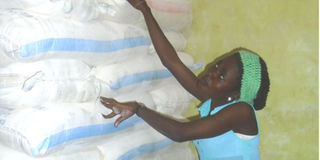Prime
Cassava flour is more valuable

Ssanyu counts bags of cassava flour in her store. Photo by Fred Muzaale
Cassava is consumed in many forms. One of the ways is by boiling the fresh cassava tubers and the other is by making cassava snacks.
However, some farmers, who grow cassava on a commercial scale sometimes find challenges in finding good market for their produce, especially in times when the supply is high on the market.
Because of this, they are paid less money as cassava’s short life is disadvantage.
This, necessitates farmers to add value to the produce so that they can earn more since they can afford to wait longer until the prices go up again.
One of the ways of adding value to cassava is by drying the tubers, which are then milled into cassava flour.
Grace Ssanyu, a cassava farmer in Kyabazaala village, Ntunda Sub-county, Mukono District, says ever since she discovered that she could earn more from her produce by turning it into flour she no longer hurries to sell fresh cassava.
“When my cassava is mature and I realise it could rot when I dont harvest it in time, I uproot and dry it then mill it and wait when the prices are good to sell,” the 34-year-old, says.
She says previously during times of high supply of fresh cassava on the market, she would be paid Shs80,000 by middlemen for a big sack.
Process
To achieve the best flour, the following steps are recommended by Ssanyu.
• Mature cassava tubers (about nine to one year, depending on the variety) are harvested.
• The cassava is then peeled using knives and the tubers sliced into small pieces.
• The slices are placed on a tarpaulin to dry for about five days. The dry pieces are then milled into cassava flour at a cost of Shs250 per kilogramme.
• The flour is then packed in 100kg bags and put into a clean, dry and not leaking store.
Market
Ssanyu supplies her cassava to breweries, those who package snacks such as bhajia, pancakes and muffins. She also sells large volumes to wholesale traders and retailers in Mukono and Kayunga districts. Her customers buy it from her store located in Kayunga Town.
Another farmer Martha Natasha, from Bukolooto Trading Center in Kayunga Town says she buys milled cassava flour at Shs80,000 and in turn sells it at Shs88,000, getting a profit margin of Shs8,000 per bag.
Challenges
Ssanyu says the cassava mosaic disease and Cassava brown streak are a big threat to the crop as it affects the tubers and makes them to rot.
Another challenge lies in the fluctuating prices of cassava flour as some customers, who turn it into cassava bread tend to switch to maize flour when maize harvesting season sets in. In the rainy season it is not easy to dry the cassava so it goes bad, which Ssanyu says requires her to buy a solar drier.
Sales
Grace Ssanyu says besides milling cassava from her garden she also buys dry tubers from farmers in Jinja, Soroti, Iganga and Kayunga and mills them. She buys a kilo of dry tubers at Shs500.
She sells a 100 kilogramme bag of cassava flour at a wholesale price of Shs88,000 and a kilogramme at Shs1,200.
In a week, she says she sells about 25 bags of cassava flour and gets about Shs2.2m and in a month she gets about Shs8.8m.
However, she says, she makes more sales during rainy seasons as it becomes very hard to dry the cassava for most farmers.
During such periods, the price of a 100 kilogramme bag of flour shoots to Shs120,000.




